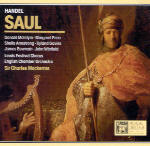This is a wonderful work, more like an opera than an oratorio (which it is called) with its fine psychological portrait of Saul, the egocentric leader with a tragic flaw, and the trouble his histrionics bring about. We also get to know the friends Jonathan and David–one gentle and rational, the other moody and flamboyant–and the scene with the Witch of Endor is a real creepfest. This 1973 performance serves the work very well, and while we might argue with Charles Mackerras’ slowish tempos (it takes 20 minutes longer than Gardiner’s), the manner in which he allows his cast to act with their words is only to be admired. Donald McIntyre’s big-voiced Saul is particularly vivid, although as David, James Bowman also creates drama with his perfectly awful sounding countertenor. Ryland Davies brings dignity to Jonathan, and one can only bathe in the luxury of Margaret Price’s soprano and the brightness of Sheila Armstrong’s. Tenor John Winfield is good as the Witch of Endor, but he could have been a bit more over-the-top for my taste. The ever-alert Mackerras allows embellishments and other period practices. The chorus and non-authentic-but-elegant-nonetheless orchestra are first rate, and the 27-year-old sonics are superb.
































